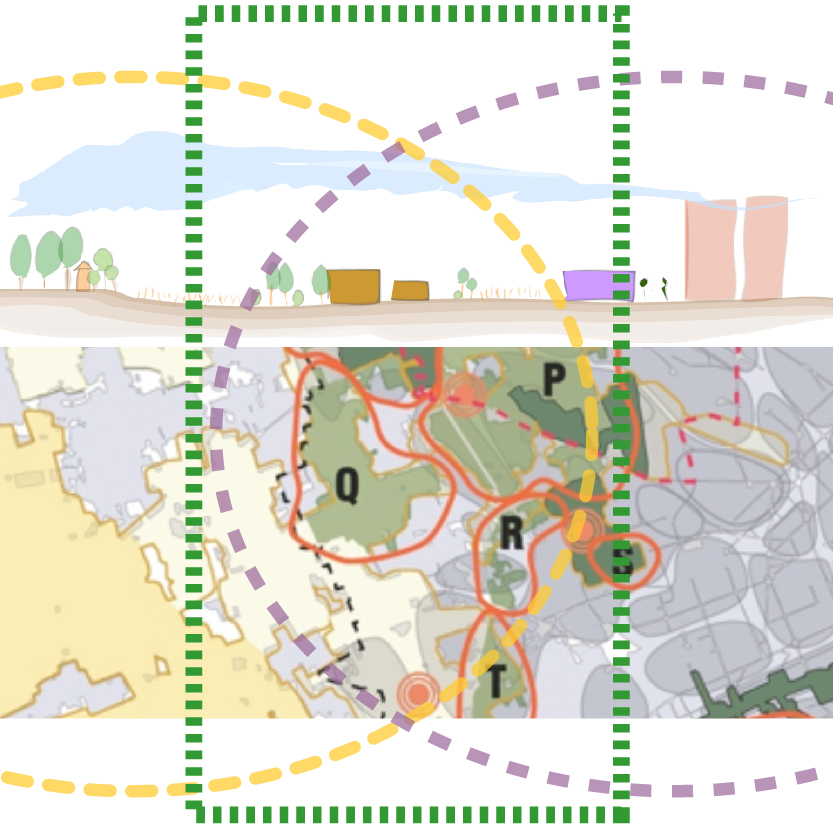The Potential of Periurban Areas for the Resilience of Metropolitan Region.
Abstract
The paper aims to present as an organic structure the outcomes from various pieces of research and consulting activities developed over the last few years (2011-2015). Shared topics are: urban-rural partnerships, food planning, metropolitan polices and the territorial resilience of periurban areas. In the first part (the core of the paper) the paper underlines critical questions and establishes needs so as to move towards a new approach to development processes in periurban areas. The paper uses some key concepts to present the main outcomes: 1. Understanding complexity (multiscales in space) and dynamics (multiscales in time); 2. Identifying all the resources and opportunities; 3. Crosscutting and multi-issues. In the second part (in the final part) the paper proposes the “Ecotone” metaphor to support innovation in the approach to periurban areas. It is a “zone of transition between adjacent ecological systems, having a set of characteristics uniquely defined by space and time scales and by the strength of the interactions between adjacent ecological systems” (Hansen et al, 1992). In these terms, periurban areas may be assumed to be ecotonal zones of transition between urban and rural or natural systems. Using the concept of “ecotonal buffer of transition” to approach the periurban systems it is possible to connect main needs and critical questions underlined to a homogeneous framework and to emphasise on the strategic role that the peri-urban systems play for the future development of metropolitan regions oriented to a improvement of resilience of socio-ecosystems. In the final part the paper focuses on the governace of urban rural partnerships and research perspectives.Downloads
References
Acha, E. M., Piola, A., Iribarne O. & Mianzan, H. (2015). Comparisons of Fronts with Terrestrial Boundaries and the “Ecotone” Concept in Ecological Processes at Marine Fronts, Environmental Science 2015, 47-51.
Colucci A. (2015). CIVES | nuove alleanze tra urbano e rurale a Milano. in Treu M.C. (Ed.), Per una città socievole. Le alterne fortune di Piani e Progetti, Reggio Emilia, Italy: Palazzo Bonaretti Editore.
Colucci, A. & Magoni, M. (2015). Protection of Peri-Urban Open Spaces and Food-System Strategies. The Case of Parco delle Risaie in Milan. Planning Practice and Research Journal, Published online 07 Aprile 2015, DOI 10.1080/02697459.2015.1028251.
Colucci, A. (2012). Towards resilient cities. Comparing approaches/strategies. Tema. Journal of Land Use, Mobility and Environment, Vol 5 (2), pp 101-116. DOI: http://dx.doi.org/10.6092/1970-9870/921
Galderisi, A., Ferrara, F.F. (2012). Enhancing urban resilience in face of climate change: a methodological approach. Tema. Journal of Land Use, Mobility and Environment, Vol 5 (2), 69-88, DOI: http://dx.doi.org/10.6092/1970-9870/936
Hansen, A. J., Risser, P. J. & di Castri, F. (1992). Landscape Boundaries. Epilogue: Biodiversity and Ecological Flows Across Ecotones. Ecological Studies, 92 (1992), pp 423-438.
Longworth N. (2006). Learning Cities, Learning Regions, Learning Communities: Lifelong Learning and Local Government, NY: Routledge.
Papa, R., Galderisi, A., Vigo Majello M.C., Saretta E. (2015). Smart and resilient cities. A systemic approach for developing cross-sectoral strategies in the face of climate change. Tema. Journal of Land Use, Mobility and Environment, 8 (1), 19-49. DOI: http://dx.doi.org/10.6092/1970-9870/2883.
Salat, S., Bourdic, L. (2012). Systemic Resilience of Complex Urban Systems. Tema. Journal of Land Use, Mobility and Environment, 5 (2), 55-68, DOI: http://dx.doi.org/10.6092/1970-9870/918.
Stockholm County Council (2015). The Urban Game 2015 Implementation project 2014-2015, Stockholm, October 2014, online report Urban Games, http://www.trf.sll.se/urban/
TEEB – The Economics of Ecosystems and Biodiversity (2014). The Economics of Ecosystems and Biodiversity (TEEB) for Agriculture & Food – Concept Note, www.teebweb.org.
TEEB – The Economics of Ecosystems and Biodiversity (2011). TEEB Manual for Cities: Ecosystem Services in Urban Management. www.teebweb.org.
Urban-Rural Partnerships in Metropolitan Areas (URMA) (2014). Recommendations on the establishment and improvement of urban-rural cooperation as a tool for territorial cohesion. http://www.urma-project.eu/documents.html.
Urban-Rural Partnerships in Metropolitan Areas (URMA) (2014). Final Pilot Implementation. Report, http://www.urma-project.eu/documents.html.
Urban-Rural Partnerships in Metropolitan Areas (URMA) (2014). Final Publication. http://www.urma-project.eu/documents.html

Copyright (c) 2015 Tema. Journal of Land Use, Mobility and Environment

This work is licensed under a Creative Commons Attribution 4.0 International License.
Authors who publish in this journal agree to the following:
1. Authors retain the rights to their work and give in to the journal the right of first publication of the work simultaneously licensed under a Creative Commons License - Attribution that allows others to share the work indicating the authorship and the initial publication in this journal.
2. Authors can adhere to other agreements of non-exclusive license for the distribution of the published version of the work (ex. To deposit it in an institutional repository or to publish it in a monography), provided to indicate that the document was first published in this journal.
3. Authors can distribute their work online (ex. In institutional repositories or in their website) prior to and during the submission process, as it can lead to productive exchanges and it can increase the quotations of the published work (See The Effect of Open Access)
